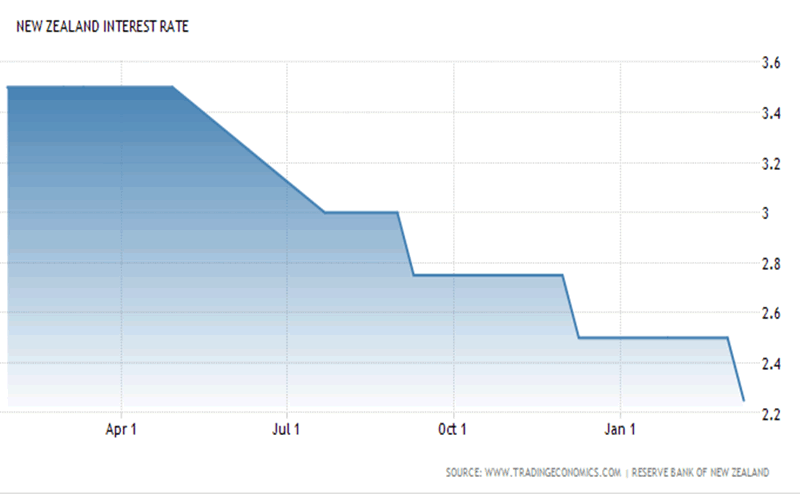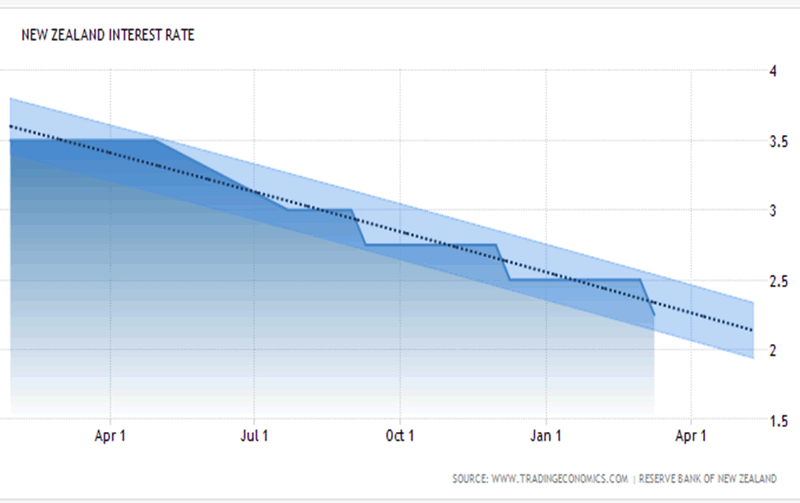New Zealand’s Surprise Interest Rate Cut Highlights Concern Of A Global Currency War
Interest-Rates / Currency War Mar 29, 2016 - 09:00 AM GMTBy: Nicholas_Kitonyi
 On Wednesday March 9th the Reserve Bank of New Zealand announced a surprise cut in New Zealand’s benchmark interest rate by 25bps to 2.25%. That is the fifth rate cut by the RBNZ since June in the hope to spur economic growth and to boost exports by weakening the New Zealand dollar. This is a historic low for New Zealand’s interest rate.
On Wednesday March 9th the Reserve Bank of New Zealand announced a surprise cut in New Zealand’s benchmark interest rate by 25bps to 2.25%. That is the fifth rate cut by the RBNZ since June in the hope to spur economic growth and to boost exports by weakening the New Zealand dollar. This is a historic low for New Zealand’s interest rate.
New Zealand’s economy is directly affected by China, as China is its largest trade partner and a major buy of New Zealand’s largest export, dairy products. The concern of a slowdown in Chinese growth is one of the main reasons for the cut in the benchmark interest rate, according to a statement by the RBNZ.

RBNZ Governor Graeme Wheeler stated that "pretty well most central banks would like to see their exchange rates lower," and a drop in the NZD would "be appropriate given the weakness in export prices." Furthermore, the RBNZ has the target to keep inflation between 1% and 3%, and with its current inflation at 0.1%, the RBNZ felt it was time to act and cut rates to increase economic growth and, therefore, also New Zealand’s inflation rate.
Increased Volatility In Currencies Due To A Global Currency War
Since China devaluated the yuan in August 2015, many of its key trading partners have tried to weaken their own currency to stay competitive with the Chinese. This creates increased volatility in the currency markets, as central banks are intervening in their domestic currency.
This is also referred to as a ‘global currency war’, as countries are trying to outcompete each other at weakening their domestic currencies. This includes New Zealand. For example, the NZD weakened by 1% the day when the RBNZ announced the surprise interest rate cut, even though the stated reasons for the rate cut, as mentioned, were to spur economic growth and increase inflation. The Reserve Bank of New Zealand is expected to continue cutting interest rates through 2020, as it seeks to spur economic growth.

For currency traders there are a range of forex trading signals to keep an eye on. But rarely is one as clear as when a country’s central bank announces a surprise interest rate cut to ensure a weakening of its currency. This is something to keep in mind, when trading currencies in the current global economic climate, especially when trading on days of interest rate decisions.
Most countries want to weaken their currencies to make their exports more competitive, so that they can boost economic growth. If you are trading currencies this is an important trend to monitor, so that you don’t get caught out by being positioned wrong. Remember the old saying ‘the trend is your friend’.
Europe Is Playing The Same Game
The ECB has cut its benchmark interest rate to zero on Thursday to weaken the euro, so that it can boost economic growth in the struggling Eurozone area. President of the European Central Bank Mario Draghi stated that “the Governing Council expects key interest rates to remain at present or lower levels for long period of time and well past the horizon of our net asset purchases,” Based on the current situation, “we don’t anticipate it will be necessary to reduce rates further.”
This indicates clearly to the market that the European Central Bank, just like New Zealand and many other countries, intends to keep its currency as weak as possible to boost exports. The ECB also stated that it will continue with its quantitative easing program to keep the Eurozone’s economy moving forward, and that without Thursday’s rate cut and the new stimulus package, the Eurozone would have experienced “disastrous deflation”.
By Nicholas Kitonyi
Copyright © 2016 Nicholas Kitonyi - All Rights Reserved Disclaimer: The above is a matter of opinion provided for general information purposes only and is not intended as investment advice. Information and analysis above are derived from sources and utilising methods believed to be reliable, but we cannot accept responsibility for any losses you may incur as a result of this analysis. Individuals should consult with their personal financial advisors.
© 2005-2022 http://www.MarketOracle.co.uk - The Market Oracle is a FREE Daily Financial Markets Analysis & Forecasting online publication.



